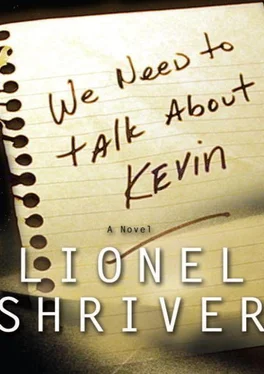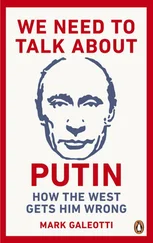That’s all she ever said.
Eva
Dear Franklin,
It looks as if that Andy Williams thing sparked off a rash of copycat crimes. But then, they’re all copycat crimes, don’t you agree?
There were four more School Shootings that spring of 1998. I remember clearly when news came in of the first one, because that was the same day Dr. Sahatjian did the drawings for Celia’s prosthesis and then took a mold of her socket. Celia was entranced when he painstakingly painted the iris of her good eye by hand; I was surprised that it wasn’t scanned by computer, but still limned with fine brushes in watercolors. Iris-painting is apparently quite an art, since every eye is as unique as a fingerprint, and even the whites of our eyes have a distinctive color, their fine red veins a personal skein. It was certainly the only element of this agonizing process that could have passed for charming.
As for the mold making, we’d been assured that it wouldn’t be painful, though she might experience “discomfort,” a term beloved of the medical profession that seems to be a synonym for agony that isn’t yours. Though the stuffing of her socket with white putty was indisputably unpleasant, she merely mewled a little; she never really cried. Celia’s bravery was peculiarly disproportionate. She was a stoic little trooper when she lost an eye. She still screamed bloody murder if she spotted mildew on the shower curtain.
As his assistant restored the conformer and applied a fresh eye patch, I asked Krikor Sahatjian idly what drew him to this niche occupation. He volunteered that at age twelve, when taking a shortcut through a neighbor’s yard, he had climbed over a spiked fence; he slipped, and the tip of an arrow-shaped iron rod…. Leaving the rest mercifully to my imagination, he said, “I was so fascinated by the process of making my own prosthesis that I decided I’d found my calling.” Incredulous, I looked again at his soulful brown eyes, reminiscent of Omar Sharif’s. “You’re surprised,” he said amiably. “I hadn’t noticed,” I admitted. “You’ll find that’s common,” he said. “Once the prosthesis is in, many people will never know that Celia is monocular. And there are ways of covering it up—moving your head instead of your eyes to look at someone. I’ll teach her, when she’s ready.” I was grateful. For the first time her enucleation didn’t seem like the end of the world, and I even wondered if the distinction the disability conferred, and the strength it could summon, might help Celia grow into herself.
When Celia and I returned from the Upper East Side, you’d gotten home before us and were settled in the den with Kevin in front of one of those Nick at Night back-to-back binges of Happy Days. I commented in the doorway, “Ah, the 1950s that never were. I keep waiting for somebody to tell Ron Howard about Sputnik, McCarthyism, and the arms race.” I added ruefully, “Though I see you two are bonding .”
In those days, I always lavished a laden irony on trendy American buzz phrases, as if picking them up with rubber gloves. In kind, I had explained to Kevin’s English teacher that the misuse of the word literally was “one of my issues” with an exaggerated wink-and-nod that must only have perplexed the woman. I’d always thought of American culture as a spectator sport, on which I could pass judgment from the elevated bleachers of my internationalism. But these days I join in aping beer advertisements when my workmates at Travel R Us cry in unison, Whass uuuuup? , I use impact as a transitive verb, and I omit prissy quotation marks. Real culture you don’t observe but embody. I live here. As I would soon discover in spades, there is no opt-out clause.
Our son, however, could read all the above and more into my disdainful pronunciation of bonding . “Is there anything, or anybody,” he asked, looking me in the eye, “you don’t feel superior to?”
“I’ve been candid with you about my problems with this country,” I said stiffly, leaving little doubt that this candor was the source of regret, and making perhaps my sole allusion since to our disastrous dinner at Hudson House. “But I don’t know what gives you the idea that I feel ‘superior.’”
“Ever notice you never talk about Americans as ‘we’?” he said. “It’s always ‘they.’ Like you’d talk about the Chinese or something.”
“I’ve spent a large amount of my adulthood out of the country, and I probably—”
“Yeah, yeah, yeah.” Kevin broke eye contact and stared back at the screen. “I just want to know what makes you think you’re so special .”
“Eva, grab a seat and join the fun!” you said. “This is the one where Richie’s forced to blind-date the boss’s daughter, so he gets Potsie—”
“Meaning you’ve seen it twenty times,” I chided affectionately, thankful for your rescue. “How many Happy Days has it been in a row now, three or four?”
“This is the first one! Five more to go!”
“Before I forget, Franklin—I got Dr. Sahatjian to agree to glass.” Petting Celia’s fine blond hair as she hung on my leg, I refrained from citing glass-what. It had fallen to me earlier that afternoon to disabuse our daughter of the expectation that her new eye would be able to see.
“E-va,” you sang, not in the mood for a fight. “Polymer is state of the a-art.”
“So is this German Cryolite.”
“Fewer infec-tions, less chance of brea-kage—”
“ Polymer ’s just a fancy name for plastic. I hate plastic.” I closed the argument, “Materials are everything.”
“Look at that,” you pointed out to Kevin. “Richie sleazes out of the date, and it turns out she’s a hottie.”
I didn’t want to poop your party, but the mission from which I’d just returned was pretty grim, and I couldn’t immediately start munching your visual junk food. “Franklin, it’s almost seven. Can we please watch the news?”
“Bor-ing,” you cried.
“Not lately it isn’t.” Monica-gate was still breaking in prurient slow motion. “Lately it’s X-rated. Kevin?” I turned politely to our son. “Would you mind very much if, after this episode is over, we switched to the news?”
Kevin was slumped in the easy chair, eyes at half-mast. “Whatever.”
You sang along with the signature tune, Monday, Tuesday, happy days … ! as I knelt to pick white putty from Celia’s hairline. At the hour, I switched to Jim Lehrer. It was the lead story. For once our president would have to keep his fly zipped to make way for two unpleasant little boys in his home state, the older of whom was all of thirteen, the younger only eleven.
I groaned, flopping onto the leather couch. “Not another one.”
Outside Westside Middle School in Jonesboro, Arkansas, Mitchell Johnson and Andrew Golden had lain in wait, huddled in the bushes in camouflage outfits after setting off the school’s fire alarm. As students and teachers exited the building, the two opened fire with a Ruger .44-caliber rifle and a 30.06 hunting rifle, killing four girls and one teacher, and injuring eleven other students. Himself wounded, if only by romantic disappointment, the older boy had apparently warned a friend the day before with cinematic swashbuckling, “I got some killin’ to do,” while little Andrew Golden had sworn to a confidant that he was planning to shoot “all the girls who’d ever broken up with him.” A single boy was injured; the other fifteen victims were female.
“Fucking idiots,” I growled.
“Yo, Eva!” you abjured. “Watch the mouth.”
“More drowning in self-pity!” I said. “Oh, no, my girlfriend doesn’t love me any more, I’m gonna go kill five people!”
Читать дальше












